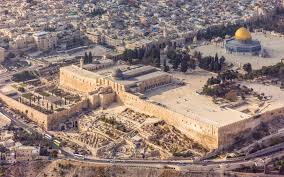Where is the line between narrative and fact? What differentiates perception and truth? And when are we obligated to speak up against falsehoods that we encounter in our lives?
These are incredibly vague questions. But recent developments within the U.N. have necessitated that, in the context of geopolitical conflict, these questions be addressed, and drawing that line might prove vital to resolving one of the most complex political altercations of our time: the Israeli-Palestinian conflict.
On Oct. 18, the United Nations Educational, Scientific and Cultural Organization Executive Board met in Paris and passed a resolution that ignores Jewish and Christian historical ties to holy sites in Jerusalem. The resolution includes one section of particular interest: Item 25, titled “Occupied Palestine”. Through five pages, the item slams the government of Israel for, among a number of alleged infractions, its actions regarding the preservation of cultural, historical and religious holy sites in and surrounding Jerusalem. The item holds Israel responsible for damaging archaeological remains, for inciting violence around the holy sites, and for restricting the freedom of worship of Muslims wishing to pray at the Al-Aqsa Mosque, which is located on top of the Temple Mount, as it is known to Jews, or the Haram Al-Sharif, as it is known to Muslims. Yet in the preceding sentence, I have made a concession that UNESCO was unwilling to make; I acknowledged the connection of the Jewish people to the Temple Mount, Judaism’s holiest site, while simultaneously acknowledging the same site’s importance to Islam.
The content of that resolution was nothing overly shocking; the U.N. has been slamming Israel on similar issues regarding the Temple Mount/Haram Al-Sharif and more for decades. But what has prompted outraged responses from politicians hailing from all corners of Israeli society, and even a group of United States legislators, is not these allegations. Instead it is that Item 25 failed to address that the Temple Mount/Haram Al-Sharif is a site holy to the Jewish people which has sparked a massive — and largely reasonable — recoil, including the decision by the Israeli government to end all cooperation with UNESCO.
Some headlines responding to the resolution were a bit reckless, if not grossly misleading. Bulletins such as British paper The Independent (“Temple Mount: Jerusalem’s most holy site has nothing to do with Judaism, UNESCO rules”) were ample in Facebook shares but short on accuracy. The third point in the resolution recognizes “… the importance of the Old City of Jerusalem and its Walls for the three monotheistic religions …” The document never says that the Jews have no connection to the Temple Mount; it downplays this connection significantly, and refuses to refer to the site by its Jewish name. And while this distortion by UNESCO is a deplorable act of misinformation and a detriment to the peace process — which will certainly be explored — the reaction should also be addressed.
The backlash in some circles comes from one of two sources: A lack of knowledge (people who read headlines and never went any further), or a shrewd political calculation that saw this resolution as an opportunity to compound frustration with ongoing bias against Israel in the U.N. and turn that frustration into political points. Both sources serve a single conclusion, the inconvenient and admittedly annoying conclusion that informing oneself is always a painful necessity for true engagement in political existence.
Overreaction notwithstanding, this resolution is indicative of an ongoing trend of bias within a supposedly unbiased international body. This bias has come in the form of ludicrously outsized condemnation of Israel — a liberal democracy, warts and all — compared to a disturbing silence in the face of human rights abuses by countries from Eritrea to China, not to mention the inclusion of frequent human rights abusers such as the UAE, Russia, Saudi Arabia and more. This resolution’s content, rather than its delivery, is symptomatic of a misguided strategy toward the Israeli-Palestinian conflict on the part of the international community; a strategy actually initiated by a desperate Palestinian leadership. For years the Palestinian National Authority, the Palestinian governing body in the West Bank, has pushed for unilateral solutions to arguably the most complicated conflict on the planet in international governing bodies such as the U.N. and even the International Criminal Court. These efforts are doomed, and the adoption of this resolution in UNESCO and the subsequent withdrawal of Israeli support for UNESCO demonstrate why.
In geopolitical conflict, forced solutions coming from outside the region of interest are doomed. Only those on the ground could ever understand the nuance required to create a lasting peace. Such a lasting peace requires a bilateral agreement between the parties involved, not imposed sanctions or mandates from international governing bodies. It seems almost too obvious to say that peace between Israelis and Palestinians must come from Israelis and Palestinians themselves, yet it needs to be said. This is not to say that international bodies do not have a role in facilitating peacemaking efforts; the exertion of outside force has been central to much of the progress made in resolving the Israeli-Palestinian conflict since its origins. Going forward, however, the international community must come to grips with its role as facilitator and not as participant.
A teacher once shared with me this quote from French philosopher Jean-Francois Lyotard, examining the lasting effects of postmodernity: “The condition of modernity is the lack of any meta-narrative that provides transcendent meaning to the lives of individuals and nations.” Lyotard’s concept of meta-narrative is a kind of myth — a comprehensive account that explains and enforces the entirety of personal and collective existence, from social norms to historical events. This particular statement on the concept disproves itself, as my teacher pointed out to me. The belief that we are living in a world bereft of meta-narrative is itself a meta-narrative, proving that existence without some sort of pervasive myth, one that ties together the otherwise seemingly random and unconnected events of our lives, is impossible. People intrinsically believe that some sort of underlying content ties together the erratic and disparate phenomena of their existence — that’s what a meta-narrative is. The same is true of nations.
What is your American myth? Could it be a story of daring revolutionaries, heroic men coming together to change the direction of human history by both the pen and the sword? Could it be a story of racial oppression and genocide, a colonial tragedy of massive proportions? Both make up the meta-narrative of the United States’ creation, our superhero origin story. Yet one thing remains the same: truth. Competing narratives could disagree on a number of things; points of emphasis, morality, value. One thing they cannot — or at least, should not — disagree on is facts. When that principle is applied to global conflict, a constructive set of moral guidelines for productive discourse may be created.
Unfortunately, a discussion of how to best make peace has not been the fallout from this most recent resolution. Instead, what has followed has been anger, frustration, hostility and more. When we view the Israeli-Palestinian conflict in the context of Lyotard’s concept of meta-narratives, we see a struggle not between two peoples, but between two myths. Both Israelis and Palestinians have inhabited the same land since at least 1948. They both have experienced, or watched the other side experience, the same events during the last 68 years. Yet both have connected the dots in startlingly different ways. It is no mistake that so much of the discussion about the Israeli-Palestinian conflict revolves around the creation of the state of Israel so long ago as opposed to the facts of today. These competing narratives each have degrees of merit. And a resolution to the conflict will come when both sides are willing to compromise on important points of their narratives. Don’t misinterpret that statement — compromising on narrative doesn’t mean accepting a foundation of anything other than truth. Herein lies the true issue of this recent UNESCO resolution and its ensuing fallout. The struggle for peace between Israelis and Palestinians has gone beyond a struggle between narratives. Instead, it has become the struggle for basic facts. A competition between narratives is not by definition a competition between realities; narrative is not fact, it is the manner and context in which facts are perceived. If Israelis and Palestinians can’t agree on the most basic foundational realities of their conflict, how could they ever possibly solve it? If so much time must be spent figuring truth from fiction, how can the two parties ever get to the real substantive issues, the ones that actually need to be resolved? While discussing this particular controversy, I was never able to address defending Israel against the allegations that the resolution makes against it, many of which I would argue are unequivocally spurious.
It is time for each side to accept reality, to acknowledge their common history, to compromise on narrative, but never on facts. Settling for half-truths and flat-out lies is not a characteristic of any road to peace that is worth going down. To even have to classify accepting reality as compromise is symbolic of the situation’s hopelessness. But if both Israelis and Palestinians could find a way to work through the differences in narratives as opposed to the perceived differences in fact, perhaps peace could be achieved. All people would benefit from distinguishing between fact — the naked truth, events, people, statistics — and narrative — that which ties the facts together into a discernible understanding of the world. At the very least, it would be a constructive development toward resolving the differences that divide us as citizens of this planet.
Aaron Bernstein is a freshman government and politics major and a contributing writer for Terps for Israel. He can be reached at abernst3



